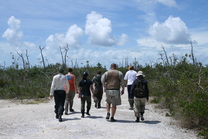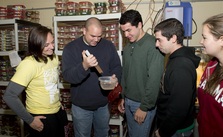Prospective Graduate Students

I typically recruit one new graduate student per year but, when funding allows, I will consider additional applications. I am particularly interested in recruiting Ph.D. students who have significant undergraduate research experience or a Masters degree in hand. However, I am always on the lookout for exceptional students aiming to pursue a Masters degree. If you are interested in joining the Earley lab, please contact me at [email protected] with a brief description of your research interests. Please also include an updated curriculum vitae complete with your educational background, GPA, GRE scores, and a list of research or travel abroad experiences, research skills and experiences (e.g., SCUBA, statistics, techniques under your belt), presentations and publications. Information about the formal application process is at bsc.ua.edu.
Keys to Success - I am thrilled to work with graduate students who have a passion for discovery that drives both their work ethic and their productivity. My aim is to recruit students who are willing to proactively develop both a solid conceptual framework for their ideas and accompanying experimental designs towards the end of generating independent research projects. I work closely with my graduate students to cultivate these skills but, I do not micro-manage their research pursuits so, a good dose of independent motivation and willingness to dive in to the literature are key! I do not require my graduate students to study the systems that we are currently using but our laboratory is best suited to study fishes and I am most interested in recruiting students interested in studying the mangrove rivulus fish. We have established field sites in the mangrove ecosystems of Florida, Belize and various other locations in the Caribbean, local watersheds, and the volcanic lakes of Nicaragua. We are a highly interactive group and one of the keys to research success, which I wholeheartedly encourage, is collaboration among graduate students and between graduate and undergraduate students, intellectual exchange during reading group (or any other time!), and close interaction with an international team of researchers who regularly visit the lab. We house over 4,000 fish in our laboratory so, I am also keen to recruit students who are invested in the husbandry of their study animals! I also encourage prospective students to contact my graduate students to get an objective opinion about conducting research in the Earley lab.
The Graduate School posts loads of information about deadlines, thesis and dissertation preparation (including the article style dissertation, which is what you all should shoot for!), and degree requirements. Biology Department graduate student information, expectations, and timelines (very important information!) can be found below and at the graduate student link on the Biology website (see the drop down menu under "Graduate Program"). I also have generated an Earley Lab Grad Student Expectations document, specific to our lab.
Please check out this list of student grants and other opportunities to see if you qualify.
Please see the "to-do" list for becoming an official member of the Earley lab.
Keys to Success - I am thrilled to work with graduate students who have a passion for discovery that drives both their work ethic and their productivity. My aim is to recruit students who are willing to proactively develop both a solid conceptual framework for their ideas and accompanying experimental designs towards the end of generating independent research projects. I work closely with my graduate students to cultivate these skills but, I do not micro-manage their research pursuits so, a good dose of independent motivation and willingness to dive in to the literature are key! I do not require my graduate students to study the systems that we are currently using but our laboratory is best suited to study fishes and I am most interested in recruiting students interested in studying the mangrove rivulus fish. We have established field sites in the mangrove ecosystems of Florida, Belize and various other locations in the Caribbean, local watersheds, and the volcanic lakes of Nicaragua. We are a highly interactive group and one of the keys to research success, which I wholeheartedly encourage, is collaboration among graduate students and between graduate and undergraduate students, intellectual exchange during reading group (or any other time!), and close interaction with an international team of researchers who regularly visit the lab. We house over 4,000 fish in our laboratory so, I am also keen to recruit students who are invested in the husbandry of their study animals! I also encourage prospective students to contact my graduate students to get an objective opinion about conducting research in the Earley lab.
The Graduate School posts loads of information about deadlines, thesis and dissertation preparation (including the article style dissertation, which is what you all should shoot for!), and degree requirements. Biology Department graduate student information, expectations, and timelines (very important information!) can be found below and at the graduate student link on the Biology website (see the drop down menu under "Graduate Program"). I also have generated an Earley Lab Grad Student Expectations document, specific to our lab.
Please check out this list of student grants and other opportunities to see if you qualify.
Please see the "to-do" list for becoming an official member of the Earley lab.
|
| ||||
|
| ||||
Prospective Undergraduate Students

I recruit several undergraduate students to the laboratory each year and I am particularly interested in accepting enthusiastic students who desire to immerse themselves in the process of scientific inquiry. I also prefer to accept students willing to work with us for more than one year - this is because it takes about a semester to become intimately familiar with the "goings-on" of the lab, and at least a couple of semesters to finalize most experiments. Freshman and sophomores are welcome...and there is absolutely no pre-requisite to work in the lab. The earlier you begin engaging in scientific discovery in a research laboratory, the more likely you are to gain the knowledge necessary to translate what you hear in the classroom to "real world" applications! We are a highly interactive group, and there are many, many opportunities to obtain a diverse skill set - from molecular techniques to animal behavior and ecology. Undergraduate students interested in SCUBA and fieldwork have also accompanied us on trips to the mangrove ecosystems of Florida, local rivers and streams, and volcanic lakes of Nicaragua. And, many of the undergraduates in the laboratory are collaborating on independent projects that will result in publication in peer-reviewed journals (a significant 'feather in the cap' when it comes to applying for graduate or professional schools!). If you plan to enroll for BSC 398 credit for your research experience, please read "BSC 398 info and expectations" found below. If you are interested in joining my laboratory, contact me at [email protected] with a brief description of your research interests.
Please also check out this list of student grants to see if you qualify.
Please see the "to-do" list for becoming an official member of the Earley lab.
Please also check out this list of student grants to see if you qualify.
Please see the "to-do" list for becoming an official member of the Earley lab.
| BSC 398 Information and Expectations |
Must read articles for prospective and current graduate and undergraduate research students (credit to the authors of these spectacular resources! Binkley Prospectus 2004 and Pigliucci Choosing Your PhD Project were found on the website of Dr. Theodore Garland, Jr in the Department of Biology at UC-Riverside)
Also, check out the following essay entitled "Twenty things I wish I’d known when I started my PhD"
Also, check out the following essay entitled "Twenty things I wish I’d known when I started my PhD"
|
|
|
| ||||||||
|
|
|
| ||||||||
|
|
|
| ||||||||
|
|
|
| ||||||||||||||

The University of Alabama is committed to providing an inclusive environment that is free from harassment or discrimination based on race, genetic information, color, religion, ethnicity, national origin, socioeconomic status, political beliefs, sex, sexual orientation, gender expression, gender identity, age, ability, size, or veteran status.

